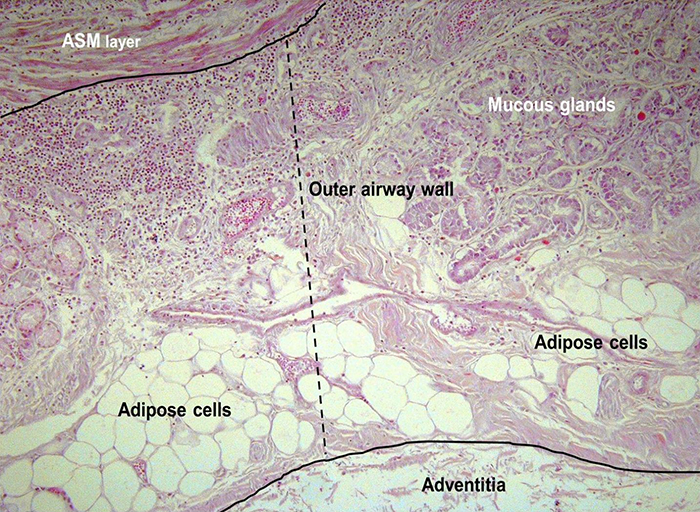Many of you will be aware of how fatty build-ups in the arteries can increase the chances of developing heart problems, but now scientists have found early evidence the same sort of clogging could happen in the lungs – and it might be linked to asthma.
It's already known that people who are overweight have a higher risk of asthma. Before now it was thought the connection could be caused by extra pressure on the lungs, or additional inflammation in the body. Now there's evidence fatty deposits may play a part, too.
Using material collected from an earlier study, the researchers looked at lung tissue samples from 52 deceased people: 15 with no reported asthma, 21 with reported asthma but who died of something else, and 16 who died of asthma itself.
 Sample micrographs showing adipose cells (fat). (European Respiratory Journal)
Sample micrographs showing adipose cells (fat). (European Respiratory Journal)
With the help of dyes to highlight the airway structures, almost 1,400 samples were analysed.
What they found was surprising - accumulated fat (adipose cells) in the airway walls.
What's more, the level of fatty tissue correlated with the body mass index (or BMI) of the individual – more weight meant more fat.
"We've found that excess fat accumulates in the airway walls where it takes up space and seems to increase inflammation within the lungs," says physiologist Peter Noble, from the University of Western Australia.
"We think this is causing a thickening of the airways that limits the flow of air in and out of the lungs, and that could at least partly explain an increase in asthma symptoms."
It's the first time fatty deposits have been spotted in the lungs, although they do appear in other organs besides the heart, including the liver.
And while this doesn't rule out previous hypotheses about how additional weight makes asthma more likely, it could be another factor to consider. It appears the fat actually alters the structure of the airways and increases inflammation, which is again linked to asthma.
The exact mechanism that's causing the fat to appear in the airways isn't clear at the moment – that's something that's going to have to wait for the next batch of research. It's also going to be important to run tests on a greater number of people than the 52 involved here.
Another question is whether the effects might be reversed with weight loss – whether with regular exercise and a healthy diet, the fat levels inside the lungs would start to decrease as a person's overall weight was lowered.
What's certain is that we need a better understanding of obesity and its effects, as well as better ways to tackle it, and fast – by 2025 it's estimated that 18 percent of men and 21 percent of women around the world will be classed as obese.
One recent study has compared obesity to an infectious disease, in the way that we might 'catch' unhealthy behaviours from those people around us.
What the latest study does is suggest another reason why maintaining a healthy weight is so important to the proper functioning of the human body – and the more we know about that, the better we can aim towards it.
"This is an important finding on the relationship between body weight and respiratory disease because it shows how being overweight or obese might be making symptoms worse for people with asthma," says Thierry Troosters, president of the European Respiratory Society, who wasn't involved in the study.
"This goes beyond the simple observation that patients with obesity need to breathe more with activity and exercise. The observation points at true airway changes that are associated with obesity."
The research has been published in the European Respiratory Journal.
